| BT-9/BT-14/NJ | |
|---|---|
 A U.S. Navy NJ-1 in flight, 1938 | |
| General information | |
| Type | Trainer |
| Manufacturer | North American Aviation |
| Primary users | United States Army Air Corps |
| Number built | +260 |
| History | |
| First flight | April 1936 |
| Developed from | North American NA-16 |
| Developed into | North American BC-1 |
The North American BT-9 was the United States Army Air Corps (USAAC) designation for a low-wing single engine monoplane primary trainer aircraft that served before and during World War II.
It was a contemporary of the Boeing-Stearman PT-13 Kaydet biplane trainer which pilots learned to fly on before advancing to Basic Flying Training on the BT-9. If they passed, they would continue on to the North American BC-1 and later the AT-6 and other aircraft types specific for each role. During the war, it was discovered that increasing the number of hours of Primary Flying Training eliminated the need for intermediate trainers like the BT-9 and so production never reached the levels for the PT and AT types. The NJ-1 was used by the United States Navy for a similar role, but was closer to the one off BT-10.